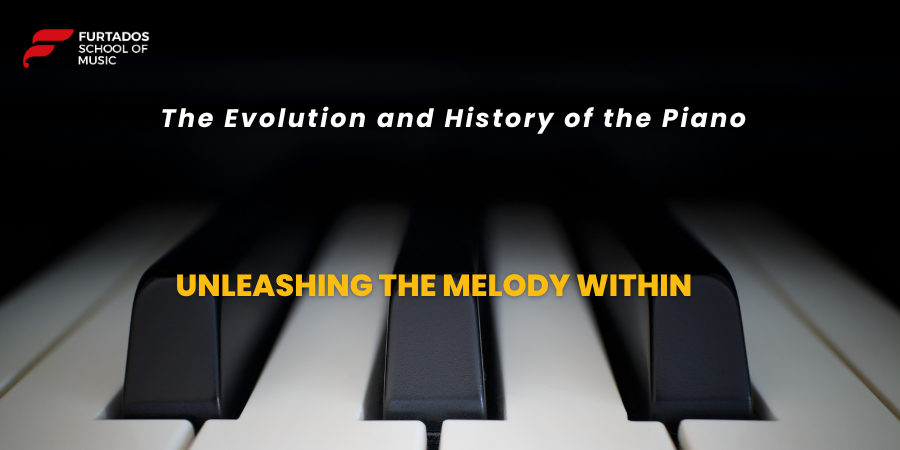In this blog post, we embark on a captivating journey through time to explore the evolution and history of the piano, one of the most versatile and beloved musical instruments ever created. From its humble beginnings to its iconic status in classical and contemporary music, the piano has enchanted both players and listeners alike. Whether you’re an aspiring pianist or simply intrigued by the instrument’s rich heritage, join us as we dive into the melodious world of the piano!
The Birth of the Piano
The piano’s roots can be traced back to the early 18th century when Italian harpsichord maker Bartolomeo Cristofori invented the instrument. His invention, originally called the “pianoforte” (meaning “soft-loud” in Italian), introduced a new mechanism that allowed players to control the volume and dynamics of the sound by pressing the keys with varying degrees of force. This innovation marked a significant departure from the harpsichord and clavichord, leading to the birth of the modern piano.
The Golden Age of Piano
During the 19th century, the piano experienced a period of remarkable growth and innovation. Legendary composers such as Ludwig van Beethoven, Wolfgang Amadeus Mozart, and Frédéric Chopin composed magnificent works specifically for the piano, pushing the boundaries of musical expression. The piano became a central instrument in households, concert halls, and salons, captivating audiences with its expressive range and versatility.
Evolution of Piano Design
Throughout history, piano makers and technicians have continuously refined the instrument’s design and mechanics. Innovations like the iron frame, cross-stringing, and the development of the modern grand piano further enhanced the piano’s tonal quality and projection. These advancements allowed pianists to unleash their artistic visions and create rich, resonant sounds that filled vast concert halls.
The Piano in Modern Music
While the piano has deep roots in classical music, it has also left an indelible mark on various genres, including jazz, blues, pop, and rock. Influential pianists like Art Tatum, Duke Ellington, Elton John, and Billy Joel have expanded the possibilities of piano playing, incorporating improvisation, syncopation, and virtuosic techniques. The piano’s ability to convey emotion and deliver captivating melodies continues to make it a cherished instrument across musical genres.
The Piano’s Cultural Impact
The piano has not only shaped the world of music but has also had a profound cultural impact. During the 19th and early 20th centuries, owning a piano was a symbol of social status and refinement. It served as the centrepiece of many homes, providing a source of entertainment and fostering a love for music among families. The piano’s presence in salons and parlours brought people together, creating opportunities for musical gatherings and fostering a sense of community.
The Piano as a Tool for Composition and Songwriting
The piano’s layout of keys and its harmonic possibilities make it an invaluable tool for composers and songwriters. Its versatility allows musicians to experiment with chord progressions, explore different tonalities, and develop melodies. Many renowned composers, including Johann Sebastian Bach and Sergei Rachmaninoff, used the piano extensively in their compositional process. Its expressive capabilities and ability to play both melody and harmony make it an ideal instrument for bringing musical ideas to life.
The Piano in Education and Therapy
The piano’s accessibility and educational value have made it a popular choice for music education programs and therapeutic practices. Learning to play the piano enhances cognitive skills, hand-eye coordination, and discipline. It fosters creativity and self-expression while instilling a sense of achievement and confidence. Moreover, piano therapy has been used to support individuals with various developmental and neurological conditions, promoting motor skills, emotional well-being, and cognitive functioning.
The Technological Advances in Piano Technology
In recent years, advancements in technology have expanded the possibilities of piano playing. Digital pianos and virtual instruments offer a wide range of sounds, effects, and recording capabilities, providing musicians with versatility and convenience. Additionally, the integration of interactive learning platforms and apps has revolutionized piano education, offering innovative tools for practice, notation, and performance. These technological developments have made learning and playing the piano more accessible to a broader audience.
The Piano as an Instrument of Endurance and Legacy
The piano’s enduring popularity can be attributed to its timeless appeal and its ability to transcend generations. Passed down through families and shared among friends, pianos often become cherished heirlooms that carry memories and stories. The instrument’s longevity and durability allow it to withstand the test of time, connecting past and present, and preserving a legacy of musical tradition.
Are you Ready to embark on your piano-playing journey? Look no further than Furtados School of Music. Whether you’re a beginner or seeking to refine your skills, Furtados offers comprehensive piano lessons for beginners and advanced learners. With their expert instructors and personalized approach, you can learn piano online from the comfort of your own home. Their interactive lessons, instructional videos, and tailored feedback provide a structured and engaging learning experience.
The piano’s evolution and history have shaped the very fabric of music, captivating audiences with its expressive power and melodic richness. From its invention by Bartolomeo Cristofori to its prominent role in classical compositions and its influence on modern music, the piano stands as a testament to human creativity and artistic expression. So, whether you dream of performing classical masterpieces, improvising jazz tunes, or composing your melodies, embrace the enchanting world of the piano. Take the first step and let Furtados School of Music guide you on your musical journey to master this magnificent instrument. Learn piano, unlock your musical potential, and unleash the melody within you.
